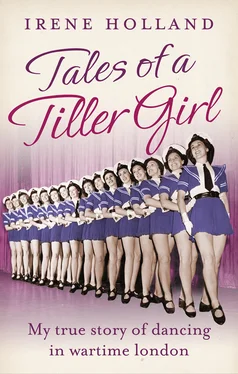‘Is your violin all right, Mum?’ I asked with a smirk.
Things were still very strained between Mum and her family, and as I got older I became more aware of the tensions. One day I went to visit my Aunty Vi, who lived in Hendon, north London. My mother never came with me, and I liked going because I could play with my cousin Shirley, who was four years older than me.
‘Violet’s a terrible snob,’ my mother warned me as she walked with me to the Tube station. ‘Just ignore anything she says to you.’
It wasn’t long before Aunty Vi started bragging about my cousin Shirley and how well she was doing at school.
‘She’s so bright there’s no doubt she’ll go to university one day,’ she said.
‘Will I go to university too?’ I asked.
Aunty Vi just laughed.
‘I doubt that very much, dear,’ she said. ‘I don’t think you’re clever enough for university. You’ll have probably left long before it’s time to do matriculation.’
Matriculation was the exam that you took in high school to determine whether you were clever enough to go on to further education.
‘Well, I don’t need to go to university,’ I told her. ‘I’m going to be a ballet dancer.’
‘A ballet dancer?’ said Aunty Vi, aghast. ‘You’ll never make a dancer, Rene. You’re not pretty enough and I seriously doubt that you’ve got the talent, either.’
Hearing that sort of criticism at such a young age from someone should have been a crushing blow. But I’d heard it all before, so I just let it wash over me and refused to get angry about it.
It was always the same criticisms that I’d hear time and time again whenever I went over there – I wasn’t clever enough, pretty enough, slim enough, rich enough. I got so used to it I didn’t even bother answering her back. It didn’t matter to me that I was constantly criticised and put down. I didn’t really care what my aunties and uncles thought. In a way it made me even more determined.
‘I will be a ballet dancer one day,’ I told my cousin Shirley. ‘Just you wait and see.’
I never told Mum what Aunty Violet had said, though. I knew she would be furious and I didn’t want to make the rift between her and her sisters any bigger.
Sometimes it was just as bad at home. I was always very loyal to my mother, and I hated it when my grandparents would criticise her to my face.
One day my grandfather was grumbling about her and saying how she never had enough money. Anyone could say what they liked about me, but when it came to my mother it was a completely different matter. I had a sparky temper and if someone pushed the wrong buttons then I wasn’t frightened of speaking my mind.
‘Don’t you dare run Mummy down like that, Papa,’ I told him.
‘I don’t know why you always stick up for your mother,’ he said. ‘She’s a failure and she should have never married that father of yours.’
‘She’s doing the best she can,’ I shouted.
My grandfather had a typical Victorian attitude to children – he thought they should be seen and not heard – and he was furious that I’d answered him back.
‘Don’t speak to me like that, young lady,’ he bellowed. ‘I’m going to lock you in your room and see if that teaches you a lesson.’
But when he tried to grab hold of me I went berserk. I lashed out at him, kicking and screaming.
‘I won’t have you behave like this, Rene,’ he yelled. ‘You’re a silly little girl who’s never going to make anything of your life, just like your mother.’
‘Yes, I will,’ I yelled. ‘I’m going to be a dancer.’
‘A dancer?’ he scoffed. ‘I doubt that very much.’
When Mum got home and I told her what had happened she didn’t seem surprised. She knew what her father was like.
‘I think it’s time that we tried to find somewhere else to live,’ she told me. ‘We need our own space.’
I knew that she found it a strain living with her parents and a few weeks later we moved out. Mum had found a job as a carer for an old spinster called Miss Higgins, who was paralysed from the chest down after contracting polio as a child and was completely bed-bound. We’d save money on rent because we’d be living with the old lady in her 1920s semi-detached house in Norbury. She had the downstairs, and Raymond, Mum and I had the upstairs. Miss Higgins was obviously wealthy, as the house was nicely decorated and pristine, but it was clear from the start that Mum hated every minute of it.
‘Oh, that woman,’ she said. ‘She just treats me like a dogsbody. It’s no wonder that she never has any visitors.’
She’d gone through several carers before Mum, and it wasn’t hard to see why. Miss Higgins wasn’t very pleasant, and Mum was at her beck and call day and night. She had to give her a bed bath, make her meals, and do her shopping and the cleaning.
Mum had just sat down one night when we heard the familiar tinkle of the bell that Miss Higgins rang when she needed something.
‘Give me strength,’ Mum sighed through gritted teeth. ‘That woman will be the death of me.’
I went down with her.
‘Can the child come and sit with me for a while?’ she said as she saw me lurking in the doorway.
‘I suppose so,’ said Mum. ‘Rene, come and talk to Miss Higgins.’
‘Do I have to?’ I sighed, but just one look at Mum’s stern face and I didn’t dare say another word.
I sat and stared at Miss Higgins. She always looked very straight-laced and she never, ever smiled. She had long white hair, and a white frilly nightie with a high collar and a knitted bed jacket on. Her bed was white, too, and she was half propped up with a pile of pillows. She was a bit like Miss Havisham in Great Expectations , a strange ghostly figure all in white. I wasn’t frightened of her, I just thought she was the most peculiar woman that I’d ever seen.
She stared at me with a very disapproving look on her face.
‘Talk to me child,’ she said. ‘Do you like arithmetic?’
I shook my head.
‘Well, what do you like doing then?’
I shrugged my shoulders.
‘What’s the matter?’ she asked. ‘Cat got your tongue?’
‘Rene, don’t be so rude and answer Miss Higgins,’ Mum told me.
‘I like w-w-riting stories,’ I stammered. ‘And d-d-drawing.’
You see, that was the real reason why I didn’t want to chat to her. I didn’t want this strange old woman to know that I had a terrible stammer as I was really embarrassed about it.
My brother Raymond had developed a very bad stammer after our father had died, and when I turned four I had started stammering too.
‘Are you sure you’re not just copying your brother?’ Mum had asked.
But I knew I wasn’t. I just couldn’t stop myself stammering. I was fine with my friends and family and people that I knew, but with strangers it was a different story. I would get nervous and I would hesitate and the words just wouldn’t come out, or I’d be halfway through a sentence and I couldn’t finish it without gasping for breath.
‘I can’t understand what you’re saying to me, dear,’ said Miss Higgins.
‘She just stammers a bit sometimes, that’s all,’ Mum told her.
It was so frustrating sometimes. Like the morning that there was a frantic knocking on the front door.
‘Run and get that, Rene, will you,’ said Mum.
I went downstairs and opened the door to find the coal man standing there. He was in a terrible state.
‘Me ’orse,’ he said in his broad cockney accent. ‘Me bleedin’ ’orse is dead. He had an ’art attack comin’ up the ’ill.’
I looked out and there was the coal man’s huge white horse lying in the middle of the street. Every day the horse would lumber up the hill near us pulling tonnes of coal in his cart, and then the coal man would tip it down the chute outside each house that led to the cellar so we could all light our fires and ranges.
Читать дальше












